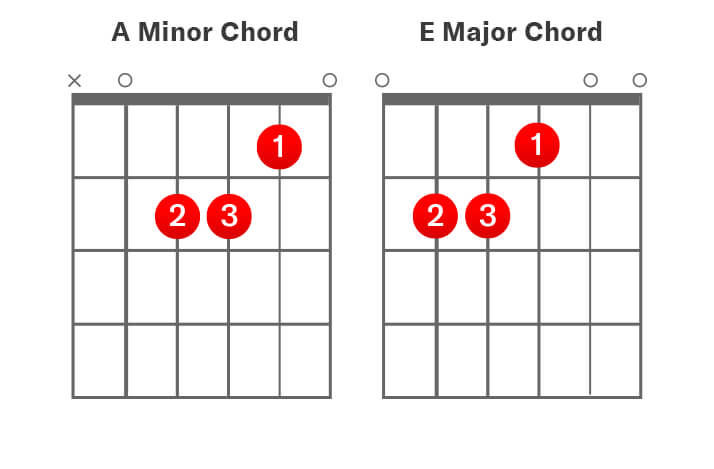A simple exercise with huge benefits, Justin will walk you through changing between two chords and how to note your progress.
BEGINNER ACOUSTIC GUITAR LESSON 12
HOW TO PLAY THE Am AND E MAJOR CHORDS ON GUITAR
In this video you'll learn the hand shape that makes up both the E major and Am chords, and where to place it to form each. Marty also teaches how to improve your muscle memory to play these chords flawlessly.
CHORDS FOR THIS LESSON

Two more very common chords used on guitar are Am and E major. The reason we learn them together is that they use the same hand shape. In this lesson, you'll learn the hand shape that makes up both the E major and Am chords, and where to place it to form each.
The A Minor Chord
The A minor chord is so common that whether you know it or not, you’ve heard it many times. Its minor tone can feel somber but can also provide an uplifting vibe when used in the right context.
Playing the A Minor Chord
Like all chords, there are several ways to play A minor. We’ll start with the open position A minor. This voicing is about as simple to play as any chord out there, requiring only three finger and very little “finger acrobatics” to get your fingers in the right place.
How to Play the A Minor Chord on the First Fret
Playing A minor in the first position requires just three fingers and (two open strings). To play A minor, first, place your index finger on the 1st fret of the B string. Next, put your middle finger on the 2nd fret of the D string. Last, put your ring finger down on the 2nd fret of the G string. Strum all the strings besides Low E together and you’ll have a full, complete A minor chord.
What Notes Make up the A Minor Chord
The A minor chord is made of three notes—A, C, E. Like any minor chord, the three notes in the chord are the 1st, 3rd, and 5th of the same minor scale.
Which Keys Have the A Minor Chord in Them?
The key of C uses the A minor chord often, since that is its relative minor. It’s also in the key of G as the minor ii and they key of Bb as the vii (with the addition of a flat fifth).
Popular Songs that use the A Minor Chord
There are far too many songs to count that use the beautiful sound of A minor. Here are a few that are quite well-known:
Johnny Cash - Hurt
The Beatles - While My Guitar Gently Weeps
Jimi Hendrix - All Along the Watchtower
Neil Young - Hey Hey My My
The E Major Chord
In some ways the E Major chord is at the heart of the guitar. By default, guitar is tuned in E Standard tuning, meaning both the highest and lowest strings are tuned to E (though at different octaves). And for whatever reason, E major is a chord most players learn very early on. So, suffice to say, it is important.
Playing the E Major Chord
Like all chords, E Major can be played in a variety of different ways, but the most common is in the first position. This voicing involves using three fingers to fret, while playing all six strings, so the other three ring open.
How to Play the E Major Chord on the First Fret
To play the E major chord, start with your index finger on the 1st fret of the G string. Then, press your middle finger down on the 2nd fret of the A string. Lastly, place your ring finger on the 2nd fret of the D string. Strum all six strings to get the full sound of the E major chord.
What Notes Make Up the E Major Chord
The E major chord includes these notes—E, G, B. Like any major chord, the three notes in the chord are the 1st, 3rd, and 5th of the same major scale.
Which Keys Have the E Major Chord in Them?
E major is rooted in the key of E, where it’s the “root” chord. The E major chord is also in the IV in the key of B and the V in the key of A.
Popular Songs that Use the E Major Chord
Many, many songs use the E major chord. Here’s a few of the most famous:
John Mayer – Slow Dancing in a Burning Room
Allman Brothers – Melissa
Van Morrison – Sweet Thing





